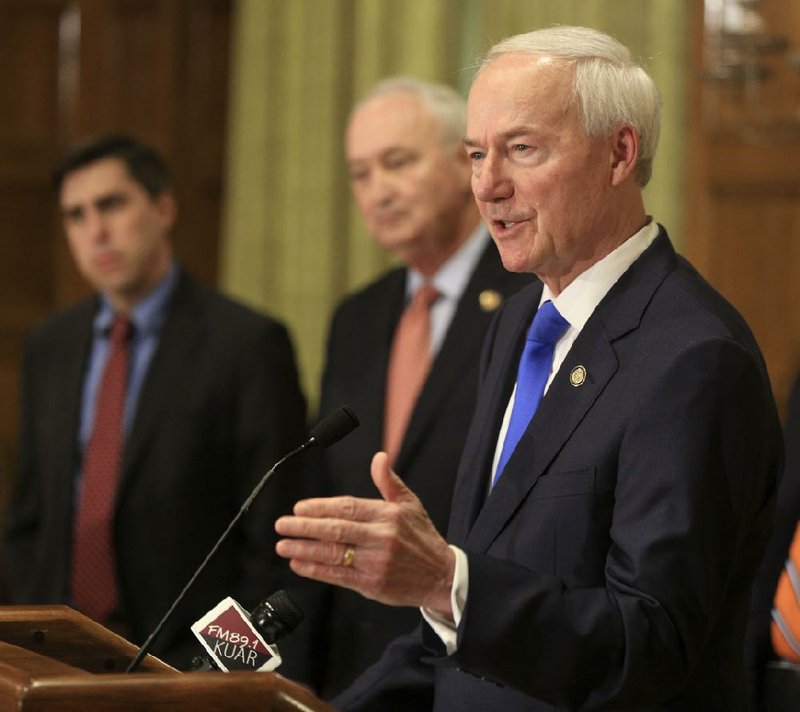Gov. Asa Hutchinson's administration wants to tap the state's rainy-day and restricted reserve funds for $3.4 million for 18 public higher-education institutions that lost general revenue funding as a result of both budget cuts and the productivity funding model.
He also is looking to the rainy-day fund for possibly $1.5 million more in the future.
The Legislature's Joint Budget Committee will consider the proposals this morning with legislative leaders aiming to wrap up by Friday the sixth-ever fiscal session, which started April 8.
These proposals resulted from negotiations between legislative leaders and the governor, said state budget administrator Jake Bleed.
Last week, Sen. Keith Ingram, D-West Memphis, told the committee that two-year colleges maintain that the higher-education productivity funding formula law protected them from receiving two cuts in a year when the general revenue forecast fell short of projections.
Under Arkansas Code Annotated 6-61-234 (f), "in any fiscal year for which the aggregate general revenue funding forecast to be available for state-supported institutions of higher education is greater than two percent (2%) less than the amount provided for the immediate previous fiscal year, the [Division of Higher Education] shall not further implement the productivity-based funding model in the following fiscal year."
The state's March 23 budget cut reduced the general revenue budget for colleges and universities by $43.3 million, to $706.4 million, in fiscal 2020, which ends June 30.
Bleed said the reduction in the forecast for fiscal 2020 meant that "the institutions that hit their productivity goals never received the benefit of having done so, but the [institutions] that did not still lost their revenue."
The language in the state law is "pretty confusing about how exactly it is to be enacted, but the belief, in working with the leaders of the General Assembly, is that we should make sure that for purposes of [fiscal] 2020, if the winners aren't going to win, then the people who lost revenue also shouldn't lose it," Bleed said.
"We worked with [House Speaker Matthew Shepherd, R-El Dorado] and [Senate President Pro Tempore Jim Hendren, R-Sulphur Springs] and the governor to come up with a solution, where we'll provide in effect up to three payments to these institutions of higher education," he said.
The first payment would go out no later than May 15 to the institutions that had a reduction in their fiscal 2020 general revenue budget because of the productivity funding formula, and the second payment would go out to the same institutions by July 15 because "we base [fiscal] 2021 budgets off of the prior year, so we don't want that loss to carry forward," Bleed said. Fiscal 2021 starts July 1.
The third payment would be a contingent release from the rainy-day fund by June 30, 2021, "in the event that we find ourselves in the exact same situation, where because of budget cuts we are not able to provide the benefits of productivity, but we're still imposing the costs," he said.
Rep. Lane Jean, R-Magnolia, said the "performing schools aren't happy of course, but the language is in the law so there is nothing we can do about it."
Ingram said, "All they did is went by the rules that you couldn't be reduced twice."
The largest beneficiaries of tapping the rainy-day and restricted-reserve funds in fiscal 2020 and 2021 include the University of Arkansas at Little Rock, the University of Arkansas at Monticello, Arkansas State University-Jonesboro and the University of Arkansas-Pulaski Tech.
UALR would get $367,839 by May 15 in fiscal 2020 and $383,948 by July 15, while ASU would receive $252,514 by May 15 and $263,572 by July 15 under these proposals, according to state records.
UAM would get $152,770 by May 15 and then $159,460 by July 15, while the UA-Pulaski Tech would receive $145,023 by May 15 and then $151,374 by July 15 under these proposals.
UAM Chancellor Peggy Doss said Tuesday that "UAM is grateful for the General Assembly's efforts to assist colleges and universities, which were affected by reductions in productivity funding and the recent adjustments to address state revenue shortfall related to the current health and financial crises.
"As a result of enhancing initiatives to better ensure student success, I'm pleased that we had anticipated a gain in funding in the upcoming fiscal year before the state's need to readjust funding to balance the budget for the upcoming fiscal year," she said in a written statement.
Larry Walther, secretary of the state Department of Finance and Administration, recommended in a letter dated Monday that the Joint Budget Committee approve the transfer of $2.54 million in restricted reserve funds to the Higher Education Division for the 18 institutions to offset the loss of funding from the productivity funding formula.
State records show that $1.67 million of these funds would be released by May 15 and $871,840.50 by July 15.
The restricted reserve fund balance totals $42.2 million, said Scott Hardin, a spokesman for the finance department.
Hutchinson asked in a letter dated Monday to the Joint Budget Committee's leaders to authorize the transfer of $2.4 million from the rainy-day fund to the Higher Education Division.
State records show that $871,840.50 of these funds would be released no later than July 15 and $1.57 million would be released as needed and no later than June 30, 2021, upon the approval of the state's chief fiscal officer.
The rainy fund balance totals $15.5 million, Hardin said.
Metro on 04/15/2020
